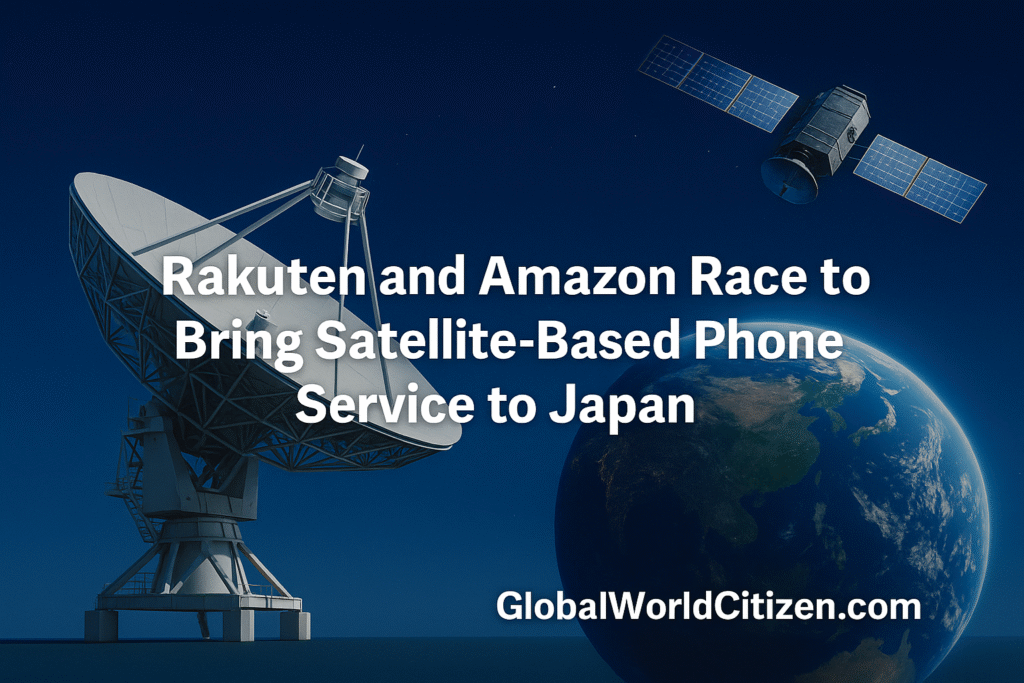📅 Published: August 18, 2025 ✍️ Author: Global World Citizen News Desk 🌐 Source: GlobalWorldCitizen.com
TOKYO, Japan – The global battle for dominance in satellite-based communications is heating up as Rakuten Group and Amazon.com prepare to launch satellite-powered phone services in Japan as early as 2026. The move could revolutionize mobile connectivity, extending high-speed internet and phone services to remote islands, mountain regions, and disaster-hit areas where traditional infrastructure is unavailable.
This development sets up a fierce telecom competition in Japan, challenging SpaceX’s Starlink, the current market leader in satellite internet services.
 Japan Prepares for a New Era in Satellite Communications
Japan Prepares for a New Era in Satellite Communications
Japan’s Ministry of Internal Affairs and Communications will convene an expert panel in September to define frequency bands and radio wave standards for direct-to-smartphone satellite services. The ministry plans to start accepting applications from telecom operators by summer 2026, signaling a green light for companies like Rakuten Mobile, Amazon, and even potential domestic players.
Satellite-to-phone technology allows users to connect directly to satellites without relying on ground base stations. This innovation ensures coverage in rural and remote areas while also providing emergency backup when ground networks are disrupted by earthquakes, tsunamis, or other natural disasters.
 Rakuten Mobile’s Satellite Ambitions
Rakuten Mobile’s Satellite Ambitions
Rakuten Mobile, which holds a stake in AST SpaceMobile, is spearheading Japan’s domestic satellite push. The company aims to launch services between October and December 2026, though President Shunsuke Yazawa has hinted the rollout could happen earlier.
Rakuten’s initial offering will focus on satellite-based text messaging, followed by a large-scale high-speed communications network capable of supporting voice calls, video streaming, and data services.
This aligns with Japan’s national security strategy, as the government wants domestically developed satellite infrastructure to reduce dependency on foreign providers.
 Amazon’s Project Kuiper Expands to Japan
Amazon’s Project Kuiper Expands to Japan
Meanwhile, Amazon is preparing to deploy more than 3,200 satellites by 2029 under Project Kuiper, its global satellite internet initiative. In Japan, Amazon will partner with NTT and SKY Perfect JSAT, while leveraging Amazon Web Services (AWS) to integrate cloud-based communications solutions for local governments and enterprises.
Amazon’s vision focuses on delivering high-speed, high-capacity satellite broadband with the support of relay antennas on the ground. This would allow seamless connectivity for businesses, smart cities, and global enterprises.
Although Amazon’s Japan unit has declined to comment on specific business timelines, the company’s move represents a major challenge to Starlink in both Japan and the wider Asia-Pacific satellite communications market.
 Starlink and the Global Satellite Internet Market
Starlink and the Global Satellite Internet Market
Elon Musk’s SpaceX, through Starlink, remains the dominant player in global satellite internet services. The Japanese telecom giant KDDI already offers satellite smartphone services powered by Starlink’s constellation, giving SpaceX a strong early lead.
However, with Rakuten Mobile and Amazon Kuiper entering the race, Japan is emerging as a critical battleground in the $192.27 billion global satellite communications market projected for 2032 (up from $85.66 billion in 2023, according to Straits Research).
 Why Satellite-Based Phone Services Matter
Why Satellite-Based Phone Services Matter
Universal Coverage: Connects rural, remote, and disaster-prone areas.
National Security: Japan aims for domestic satellite technology to secure communications.
Global Competition: Starlink vs. Rakuten vs. Amazon will shape the future of 5G, 6G, and space-based connectivity.
Economic Growth: A rapidly growing sector that could reshape the global telecom and internet infrastructure market.
 GlobalWorldCitizen.com Insight
GlobalWorldCitizen.com Insight
The race between Rakuten, Amazon, and Starlink in Japan highlights the future of global communications:
Space-based mobile networks will become the backbone of the next-generation global economy.
Companies that dominate this market will control not just internet access, but also data sovereignty, digital security, and global cloud infrastructure.
For Japan, satellite-based phone services represent more than convenience—they are a strategic necessity for resilience, connectivity, and economic strength in an increasingly digital world.

#SatelliteInternet #Rakuten #Amazon #Starlink #SpaceX #JapanTelecom #SatellitePhone #GlobalWorldCitizen

